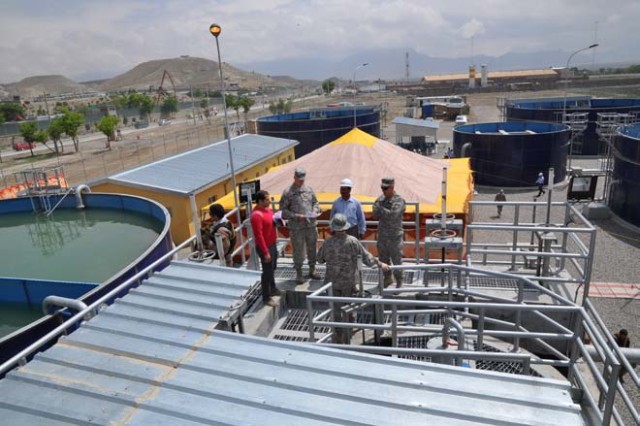Kabul -- The U.S. Army Corps of Engineers celebrated the completion of two multi-million dollar projects in support of the Afghan national security forces this week.
The first project is a $4.5 million Afghan National Civil Order Police station located in the town of Marshal Kamar, Laghman Province. The station includes senior and ordinary barracks, an administrative building, a parade field, an addition to the existing dining facility and an entry control point for better security on the site.
Though the project is complete, there are still some challenges that the site is facing and the Corps is helping ANP to overcome them. "The biggest challenge right now is water filtering because the water is coming from a river down the way," said Robert Woodward, a construction representative who is deployed from the Fort Leavenworth, Kan. Corps of Engineers District and works in the Jalalabad area office here. "It's a technical problem but we're going to be putting in a deep well to try and enlarge the septic system to accommodate the size of the base."
The contractor on the project is Fazlullah Construction Engineering Company. During the height of construction, FCEC employed up to 100 Afghan construction workers. "Nobody does a better job than FCEC," said Col. Thomas Magness, Afghanistan Engineer District North commander. "No matter what country they come from, they always get the job done right."
Magness went on the praise the quality of the construction and emphasized the partnership between the ANP and the Corps of Engineers. "Together, we will make sure this facility serves your mission; I look forward to the many security successes your station has," he said.
Improving the security of the Afghan people is a top priority for the Corps of Engineers, and the Marshal Kamar police station provides the people in the town a more secure police force that now has room to grow. "This facility has given them a better capacity to have more police officers in this country and to provide more security," said Woodall. "We've given them protection with the walls and other security features on premise. As their police and military grow, they need more room, so we're helping them with that. It's a good thing." The Marshal Kamar police station will accommodate 165 ANP officers.
The second ribbon-cutting ceremony that AED-N attended was for a $5.5 million waste water treatment plant in Kabul for the Afghan National Army Kabul Military Training Facility. The current ANA WWTP has reached capacity and no longer meets the needs of the more than 26,000 soldiers that occupy the KMTC.
The new treatment plant is an all automated, hi-tech facility that will increase sewage treatment from 1,000 cubic meters per day to 4,000 cubic meters per day. The new plant consists of two clarifiers, two aeration tanks, a sludge tank, a contact tank, holding ponds and a control building.
"Today we can say we can handle four times more waste than before and the ANA can operate their soldiers the way they want to," said Magness.
FCEC also served as the contractor for the WWTP. At the height of construction, 100 to 200 Afghan construction workers were employed. The new facility will work in conjunction with the old treatment plant which is next door to the new facility.
"I am sure the capacity of ANA will be increased because of new facilities like this one," said Afghan army General Zaman Hamim. "I appreciate all of our team and their work here to help build the Afghan National Army."




Social Sharing